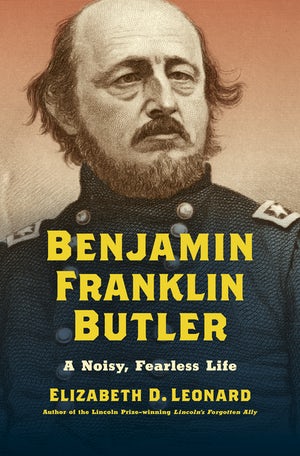Elizabeth D. Leonard on “Benjamin Franklin Butler: A Noisy, Fearless Life”
Benjamin Franklin Butler was one of the most important and controversial military and political leaders of the Civil War and Reconstruction eras. Remembered most often for his uncompromising administration of the Federal occupation of New Orleans during the war, Butler reemerges in this lively narrative as a man whose journey took him from childhood destitution to wealth and profound influence in state and national halls of power.
Prize-winning biographer Elizabeth D. Leonard chronicles Butler’s successful career in law defending the rights of the Lowell Mill girls and other workers, his achievements as one of Lincoln’s premier civilian generals, and his role in developing wartime policy in support of slavery’s fugitives as the nation advanced toward emancipation. Leonard also highlights Butler’s personal and political evolution, revealing how his limited understanding of racism and the horrors of slavery transformed over time, leading him into a postwar role as one of the nation’s foremost advocates for Black freedom and civil rights, and one of its notable opponents of white supremacy and neo-Confederate resurgence.
Elizabeth D. Leonard is the John J. and Cornelia V. Gibson Professor of History Emerita at Colby College in Waterville, Maine. A native of New York City, she earned her Ph.D. in U.S. history from the University of California, Riverside, in 1992. Leonard is the author of several articles and five books on the Civil War-era including: Yankee Women: Gender Battles in the Civil War; All the Daring of the Soldier: Women of the Civil War Armies; and Lincoln’s Forgotten Ally: Judge Advocate General Joseph Holt of Kentucky, which was named co-winner of the Gilder Lehrman Lincoln Prize in 2012.
She is currently engaged in research for a new project, which weaves together a deeper study of Judge Advocate General Joseph Holt’s transformation from slaveholder to willing advocate and enforcer of Lincoln’s emancipation policies, and the story of the lived experience of enslaved men from the region of Kentucky where Holt was raised—including one of Holt’s own former slaves—as they ran from slavery to fight for freedom in the Union army and then returned to try and claim the promises of Emancipation.




